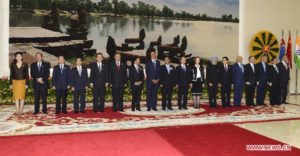
U.S. President Barack Obama (center) at the 2012 East Asia Summit in Phnom Penh, Cambodia. Image: Xunhua
There can be no denying the fact that U.S. President Barack Obama’s cancellation of his trip to Southeast Asia, October 6-12, where he was scheduled to attend to attend the APEC Economic Leaders meeting in Bali, Indonesia, then the East Asia Summit in Brunei, followed by visits to Malaysia and the Philippines, is extremely unfortunate. This was to have been only the second time that a US president has gone solely to Southeast Asia, highlighting the growing significance of this region to the United States, primarily because of the growing U.S.-ASEAN economic ties and the central role that ASEAN has in Asian institutional building and multilateral engagement. Last year, President Obama missed the APEC Economic Leaders meeting in Vladivostok, Russia, due to the then pending U.S. election. A popular mantra that one often hears around Washington, D.C. regarding Asia is that more than half the story is just to turn up. Another way of looking at it is: “If you are not in, you cannot win.” The fact that President Obama cancelled the trip due to domestic politics of a partial government shutdown and continuing uncertainty of raising the national debt-ceiling limit by October 17 does nothing to help the situation.
Upon saying that all is not lost; U.S. Secretary of Defense Chuck Hagel completed by all accounts a very successful four-day visit to South Korea, an unprecedented amount of time for a U.S. secretary of defense to remain in a foreign country. The primary reason for the visit was to commemorate and celebrate the 60th anniversary of the U.S.-ROK Alliance and to partake in the 45th ROK-US Security Consultative Meeting. The endurance, adaptability and forward-looking U.S.-ROK alliance continues to be a bedrock of stability in an uncertain neighborhood amidst North Korea’s dangerous trajectory of defying international law in its ongoing pursuit of developing nuclear weapons.
Secretary Hagel then went to Japan where, with U.S. Secretary of State John Kerry, they met with their Japanese counterparts for the Security Consultative Committee or “2+2.” Again, the endurance of the of the U.S.-Japan Alliance has long been credited with maintaining and preserving peace and stability in the region. This in turn has enabled other countries to focus on economic development and today the Asia-Pacific is the most economically dynamic region in the world. The U.S.-Japan Alliance continues to evolve with both partners looking to integrate more interoperability as the alliance responds to the fluid security situation in the region.
Secretary Kerry represented President Obama at APEC and the EAS and while many Asian leaders empathized with the president’s position, his absence was unfortunate. Kerry was accompanied by U.S. Trade Representative (USTR) Michael Froman and Secretary of Commerce Penny Pritizker, even as both their respective departments were not operating at full capacity due to the government shutdown.
High on the U.S. agenda were the Trans Pacific Partnership (TPP) trade negotiations that the United States is engaged with eleven other APEC states—Australia, Brunei Darussalam, Canada, Chile, Japan, Malaysia, Mexico, New Zealand, Peru, Singapore, and Vietnam—“an ambitious, next-generation, Asia-Pacific trade agreement that reflects U.S. economic priorities and values.” President Obama was scheduled to meet with his eleven TPP partners, giving a much-needed impetus to driving the negotiations towards the end goal of an agreement. In a recent speech at CSIS, former Assistant Secretary of State for East Asian and Pacific Affairs Kurt Campbell said that that TPP should be top priority for US foreign policy with the Asia-Pacific. However, some experts think that to finalize the trade negotiations by the end of this year is too ambitious, as individual countries seek to protect their own special interests. Either way, at this moment in time it seems prudent to predict that negotiators have a few more meetings in front of them before an official announcement on the conclusion of the TTP negotiations is released.
Another missed opportunity was the U.S.-ASEAN Summit where President Obama was scheduled to meet with his ten ASEAN counterparts. The fact that Obama was not at the all-important East Asia Summit that addresses regional security issues again was anything but good for the United States. As were his missed trips to Malaysia and the Philippines. Secretary Kerry did go to Malaysia, but not to the Philippines due to a pending typhoon. The unfortunate fact is that President Obama’s failure to attend these regional meetings because of U.S. political gridlock, some say dysfunctionality, just does not send the right message.
Looking ahead, it is fully expected that President Obama will go to Asia once the domestic political gridlock ends here in Washington and that he will visit Indonesia, Malaysia and the Philippines. Maybe it will be possible for President Obama to welcome an Asia leader or two to the White House before he goes out to Asia? The hope is that Obama will be able to make up for this lost opportunity in due course, and this episode will not have any lasting repercussions for U.S. standing and creditability in Asia. As highlighted above Hagel’s trip to South Korea followed by the 2+2 in Japan with Secretary Kerry did do much to further U.S. goals in Asia. That President Obama missed APEC and the EAS is not the end of U.S. engagement in Asia, lemons can be made into lemonade. Obviously if the United States fails to raise its debt ceiling and the unimaginable happens in that the U.S. defaults on its national debt, that lemonade will quickly turn to vinegar, and not just for U.S.-Asia relations, but for U.S. standing in the world.
Damien Tomkins works at the East-West Center office in Washington, D.C. where he contributes research and content to the Asia Matters for America initiative and coordinates the Asia Pacific Bulletin publication series. The views expressed here are solely those of the author and not of any organization with which he is affiliated.